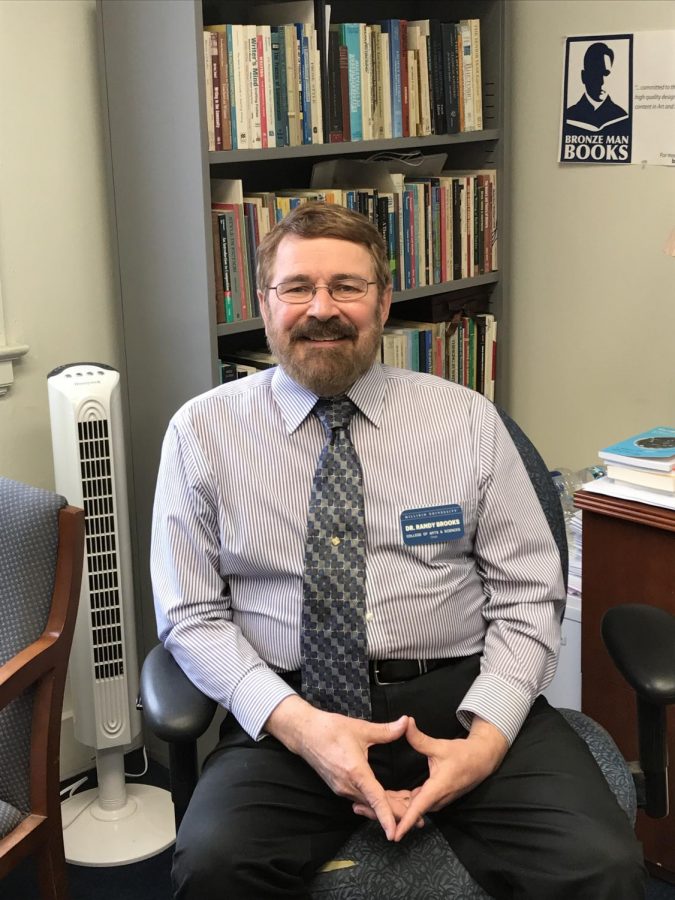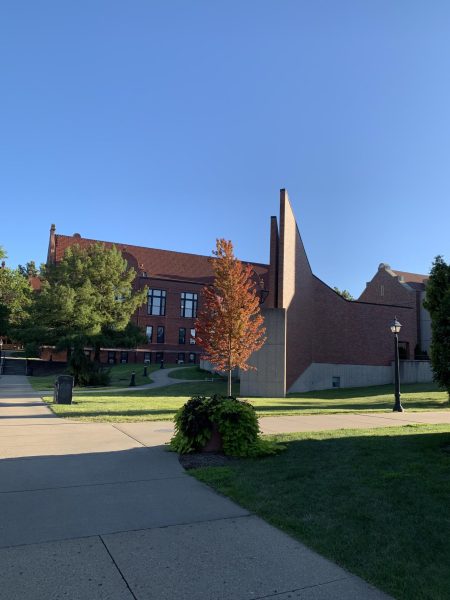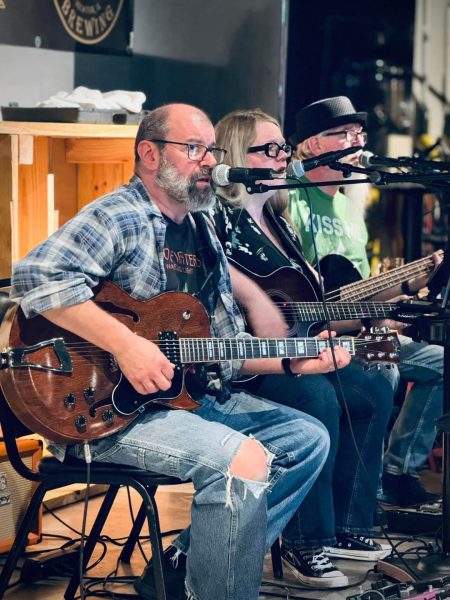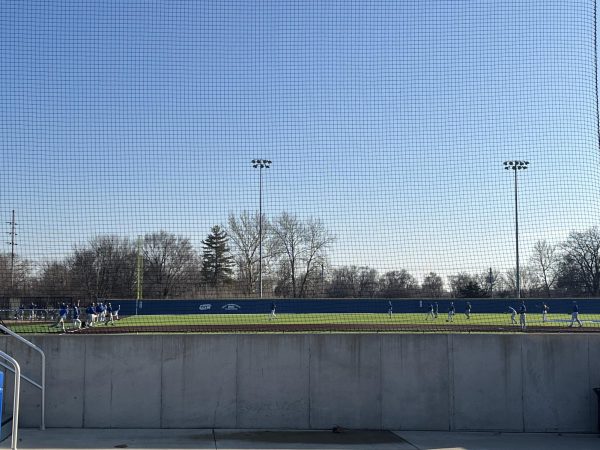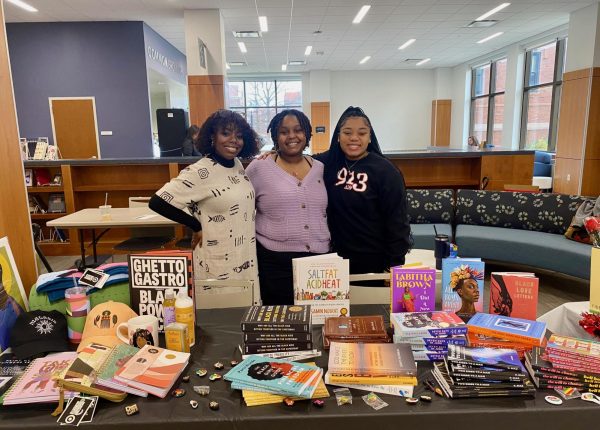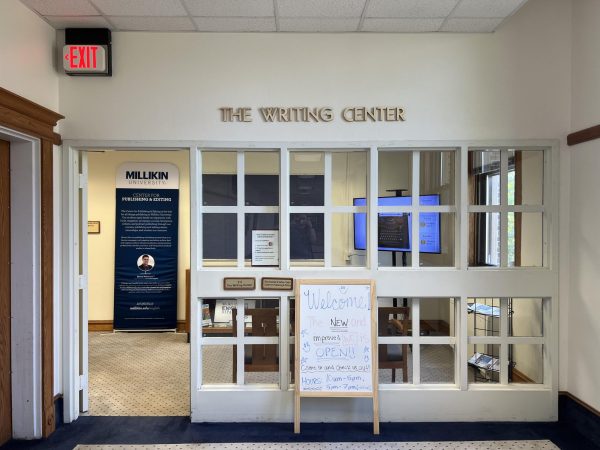Dr. Randy Brooks, Teacher and Poet
A haiku is a three-line poem with seventeen syllables. Five in the first line. Seven in the second line. Five in the last line.
Dr. Randy Brooks, the Dean of Arts and Sciences at Millikin University, has dedicated the past forty-one years of his life working within the art form.
Although I’m an English major at Millikin, I had somehow made it to my senior year without ever getting to know Dr. Brooks. Upon being assigned to write a feature article about him (this feature article), I began dropping his name around the English crowd in hopes of gauging their reactions. Nearly every student raved about his haiku writing course. Admittedly, although I’m a fan of short poetry, I’d never thought of haiku as a living art from. In regards to haiku, the only writer I could name was Matsuo Basho, who is the William Shakespeare of haiku, but died in 1694. Yet, dozens of students praised his work, and many asked me to read haikus that they’d written in his class.
At 9:00 A.M. on a Thursday, I walked to Dr. Brooks’ office for our first meeting. I pretended to be enthused, but my button-up shirt and thick frame glasses couldn’t hide my tired eyes. Upon reaching his office, I found that his secretary was out. I stood alone for several minutes, until I mustered the courage to peek into his room. There, Dr. Brooks sat behind a wooden desk. He was sorting through emails, and didn’t notice my presence until I barfed an awkward hello. He turned around, then stood up to shake my hand across the desk, and offered me a seat. Aside from what his students had told me, and what I’d learned from Googling his name, I knew nothing about him. Aside from what he may have remembered from my files that had crossed his desk, he knew nothing about me. As I shuffled through my notebook, searching for a prewritten list of vague questions, Dr. Brooks turned the interview on me. He began asking me the things that I should have been asking him. He wanted to know what I liked to write, how I was enjoying Millikin, and the kind of literature interested me.
Working within a time constraint, I answered his questions as quickly as I could, and attempted to redirect the questions back at him, by rephrasing the topics that he’d asked me. After puttering through a few minutes of friendly conversation, we hadn’t yet found our footing. I was beginning to feel pessimistic about the interview, but my google research had given me a jumping off point. The night before, I’d found one of Dr. Brooks’ haiku online, and with acknowledgement of my objectivity, and limited knowledge of haiku, it’s one of the best short poems I’ve ever read.
I was apprehensive to repeat the line, as writers often become antsy when you mention their work. However, being that we hadn’t yet established ground to build on, I decided to take the risk.
“two lines in the water…
not a word between
father and son”
As I recited this poem, his lips shifted from a polite smile, to a genuine smirk. Within a couple of minutes, he was walking back and forth between his chair and bookshelf. He’d pull a haiku book off the shelf, place it on the desk in front of me, take a seat and discuss the work for roughly thirty seconds until it would remind him of another book, then walk back to the shelf and grab another.
“I’ve written about twenty haiku this week.” said Brooks, “And a few Tanka”.
Before parting ways, Randy sent me with a copy of his book “School’s Out”, and the publication he currently runs, “Mayfly”.
“The title of this collection is ‘School’s Out’ for several reasons.” said Brooks, “First, when I reviewed the haiku I have written and that I have published since 1976, I noticed that a large majority of the poems are summer haiku. A second reason for the title is that I believe in lifelong learning, which extends beyond lessons in a classroom. Although I have never disliked school and have learned a great deal in school, I know that I have learned much when I have been out of school, as well. I will always advocate summer vacations and sabbaticals because these are times when students and teachers can reconnect to the world, to life beyond the classroom, to nature.”
The title poem in this book reads,
“school’s out-
a boy follows his dog
into the woods”
After hearing this, I couldn’t believe that he had dedicated so many years of his life to mastering such a structured art form.
“The attitude about choosing your art and mastering one corner of it is kind of a Japanese philosophy.” said Brooks, “You have to choose your art, and dedicate yourself to mastering that. In the United States, the attitude is that these things (different forms of poetry) are not that far from each other, and we just like to experiment and play.”
Dr. Brooks has been writing haiku since 1976. He’s dedicated himself to working within the structure for forty-one years.
“My senior year as an undergraduate student, I won the literary award for some of my poetry.” said Brooks, “A friend of mine and I published a collection called ‘20/20’, because we were both twenty years old, it was a play on 20/20 vision, and we had twenty poems each. So I went to the bookstore and bought books of poetry with the money I’d won from the award. I bought a book of Chinese poetry, and I saw this collection of modern Japanese haiku. I bought the haiku anthology too, which is a collection of English haiku, and I could not believe this tradition in Japan that had been going on since 1100.”
Going into our second meeting, I felt more comfortable conversing with him. His wire glasses and inviting smile cause our interactions to feel less like an interviewer-interviewee relationship. It feels more like I’m conversing with one of my grandfather’s friends. His gentle face always appears as if it’s asking “How can I help you today?” If you introduced him to a stranger, and gave that stranger three guesses about Dr. Brooks’ profession, that stranger may guess, counselor, teacher, or professor.
Before our meeting, I had read his book, “School’s Out”. Excited to impress him, I cultivate a discussion about the book’s main themes. After recognizing the juxtaposition of opposites in his work, i.e. birth and death, youth and old age, innocence and experience, I point them out in a matter-of-fact fashion. To my surprise, Randy behaves as though I’ve read too deeply. In his opinion, each haiku is an individual story. Therefore, there can be no juxtaposition, only reflections and themes. My mistake, was reading them as a collective. However, he was glad that I’d recognized, and connected with the book’s ideas. Being that we’re both Midwesterners, and lovers of the outdoors, our conversation naturally drifts into discussing the great outdoors.
In the author’s introduction to “School’s Out” Brooks said, “Haiku has taken me out out into the woods, to the pond’s edge, the shore line, the mountain ridge, the distant country, and haiku demanded that I learn from my observations, my perceptions, my feelings of being ‘out there’.”
There’s a certain level of homeliness in Dr. Brooks’ poetry that resonates with me as a Midwesterner. Being that the Midwest is flat, and is mostly covered with soy and corn, I often take Midwestern life for granted, and allow it to become the butt of the joke. At a liberal arts college where the majority of my friends are liberal and eccentric, I often find myself behaving as though I’m superior to my roots, even though I don’t truly believe it. However, the poems in “School’s Out” remind me of the treasures, the struggles, and the culture of Midwestern life, that I should learn to appreciate.
“pumpkin pie aroma
from the back seat-
Kansas sunrise ahead”
“show me yours.
you first.
barn roof creeks”
“dirt farmer’s wife
at the screen door-
no tractor sound”
It’s poems like those that have been listed above that make me recall the subtle pleasures, and the common struggles of the country lifestyle, that I’ve spent so much of my life trying to separate myself from. During my time in academia, I’ve often found small town life mocked, and small town stereotypes ignorantly perpetuated. Sadly, I’ve taken part in this as well. Yet, in these poems, I see Dr. Brooks’, a well respected, highly educated, and talented man, who has built his craft around appreciating the life that I’ve pretended to loath. In reality, I love all the things he mentions in his book. I love to fish in a steel jon-boat. I love sitting on truck beds, listening to acoustic music at a bond-fire. And I love the taste of warm pumpkin pie.
Although Dr. Brooks is always excited for breaks, this doesn’t mean that he loves his job as a teacher, or as the dean any less. He’s been working as the Dean of Arts and Sciences since 2008. Before that, he’d been the Dean of Teaching and Learning for eighteen years.
“I am often promoting and encouraging the intellectual work of individuals.” says Brooks. “Both roles [teaching and publishing] are about helping writers and knowledge-makers share their ideas with others through writing or teaching.”
Dr. Brooks gave me this haiku, which refers to his work as the Dean.
“evening walk
after office politics
lilac scent”
After asking for permission to sit in on one of his classes, Dr. Brooks invited me to take part in his haiku class. I say that he asked me to take part in the class rather than to observe it, because he encouraged me to be as engaged with the material as his students.
I walked in five minutes before class started, and most of the students were already in their seats. This is rare, especially because this class takes place on the top floor of shilling hall, and students have to walk four stories to get to the classroom. There’s an energy in the room that I couldn’t put my finger on. His students seem as if they actually want to be there. Even before class starts, they’re already discussing their assignments.
I take a seat far back in the room, hoping to silently watch, and to scribble notes about the student teacher relationship. However, when Dr. Brooks enters, he asks me to take the seat next to him. Then, he introduced me to the class.
“It’s Kukai day,” Brooks said.
Kukai is a tradition in which writers anonymously share their poems with a group, and the group votes as to which haikus are their favorite, and provide reasons why they enjoy each poem. As they voted, Dr. Brooks tallied the votes inside his notebook. This wasn’t a time to be critical of the poems, only to discuss what aspects of the poems they admire. It was considered extremely rude to provide negative feedback, unless the poet asks you specifically, outside of kukai time, to do so. This hinders a positive environment, in which students may share their work without judgment.
At the end of each poem that was shared, the students applauded the poem by tapping their pens or pencils on their desks in a rhythmic fashion, and the author revealed themselves to the group. On several occasions, after a poem was praised, nobody claimed it. Dr. Brooks refers to these poems as “orphans”, as they don’t have a parent.
The students went around the room performing this workshop for the entirety of the class period. Every time I focused on the notebook, Dr. Brooks would make an effort to bring my head back into the classroom. He was subtly telling me to observe the class with my eyes and ears, rather than with my pen. He provoked me to engage with the students’ material. He wanted to know which haikus I liked best, and why they stimulated my attention.
At the end of class, Dr. Brooks counted the votes, and began announcing the winners. He said the names of the students who had received the most votes in order, starting with the students who had received the most votes, and worked his way downward. As he called names, the students stood up, and approached a desk at the front of the room, which was covered in various haiku books. The students picked out the books that interested them most (which, for the most part, appeared to be decided by the designs on the covers) and were allowed to take them home as a trophy. Although I lost count, I believe he gave out around a dozen books, all from his personal collection.

